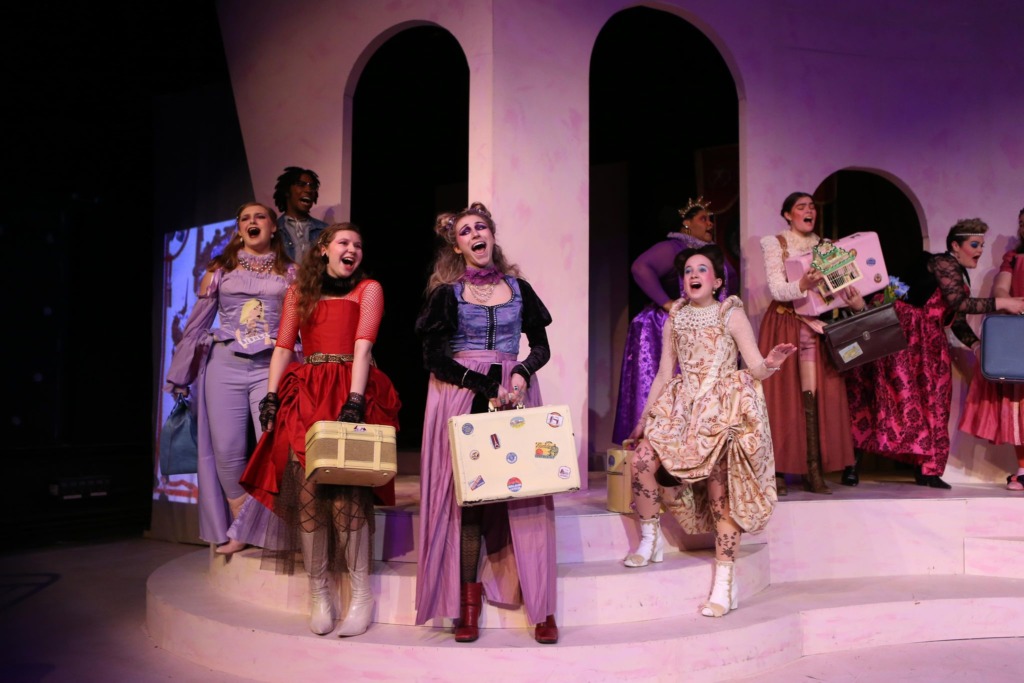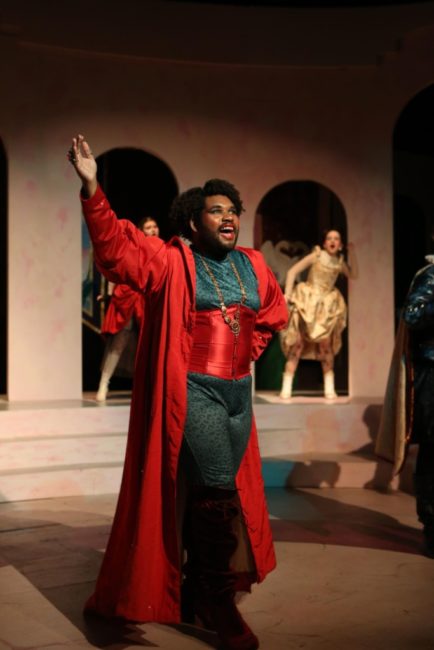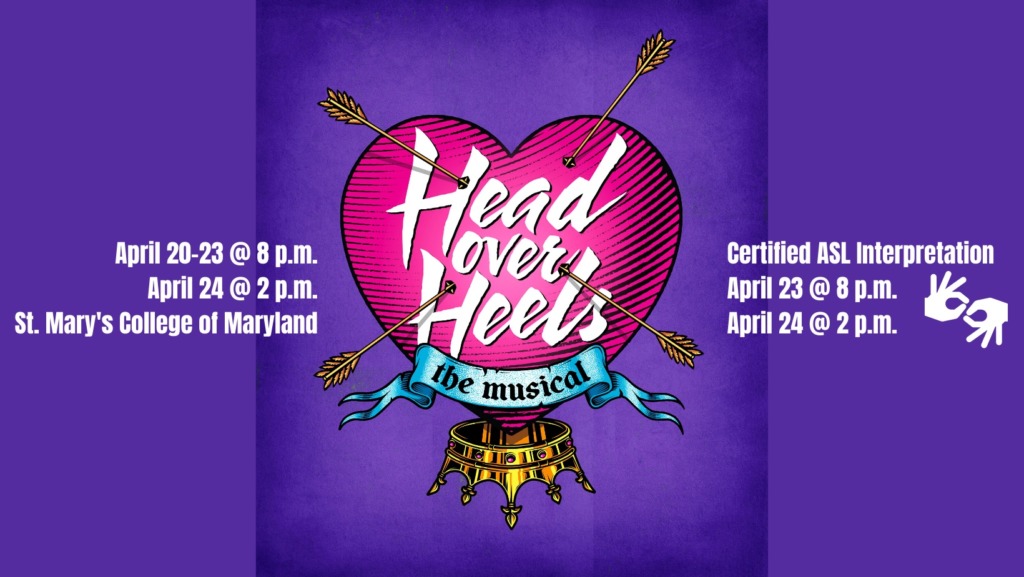Arcadians swear their beat is divine! And they want you to get up and go! Go get tickets, that is, to the St. Mary’s College of Maryland’s production of Head Over Heels the musical, featuring the song-catalogue of The Go-Go’s. Based on The Arcadia by Sir Philip Sidney, conceived & original book by Jeff Whitty, with he aforementioned pop-rock band music providing the songs, this production is Directed by Matt J. Bannister, with Musical Direction by Larry Vote, Choreographed by Donna Jordan, and Fight & Intimacy Choreographed by Mallory Shear. It’s definitely a musical that’s marching to its own beat.
The musical on the whole is problematic— and that’s not to disparage any of the talented youngsters involved in the production at St. Mary’s College— with an archaic text and plotline being utilized to for self-expressionism and identity affirming concepts, woven around the song catalogue of a group for whom the target audience (and the target market of those interested in performing the show) is out of their historical context, the show makes for a bit of an enigmatic headache if looked at too deeply. (Let’s face it, the plot is not dissimilar from Queen’s We Will Rock You in the sense that it’s so ludicrous that it becomes enjoyable…except with Head Over Heels the song catalogue doesn’t well-support that absurdity.) All of that aside, the young performers featured in this production are really giving ‘the beat’ their all, fully expressing themselves, and treating this piece of theatre like a come-together anthem for the message of “Be your best self, live your best life, and you be you no matter what others think and say.” (You can’t fault the performers when the blame of a poorly executed concept-musical falls solely on the librettist and choice of which band’s song-catalogue to use.)

Mesmerizing costumes and sets, by way of Costume & Scenic Designer Leah Mazur, immediately drawn the audience into this unplaceable, inexplicable fantasy-turned-pop-fairytale enigma. (The setting literally says “The Kingdom of Arcadia, the temple of the Oracle of Delphi, and the road to Bohemia where the 16th century and the 1980’s collide.) Mazur has painted a sweeping Gender Nonbinary Icon up the main aisle of the theatre entrance ending in the center of the stage (which is columns and cutout windows of the temple, the palace, etc.) and firmly represented the importance nonbinary identity (a central conceit of the show) right in the middle of the play space. Mazur’s costumes defy description in the most amazing way possible. A lurid hybrid of what one guesses to be 16th century ‘Arcadian gear’ blended with this 80’s vibe of Go-Go boots, big hair, and glitzy glam makeup. It’s a wonder to be seen, particularly in the more garish electro-pop shades of pink and purple featured on some of the principal characters. (Trust me when I say my description here fails to do the astonishing wonders Mazur has fabricated for this show’s couture any sort of justice.)
If you’re going to do a show that’s “set where the 16th century clashes with the 1980’s…” there is a certain expectation that the choreography will follow suit. Maybe not the 16th century part, but definitely some of the popularized moves of the 1980’s dance scenes. And choreographer Donna Jordan manages to successfully incorporate some of these moves, particularly when it comes to clapping, slapping, shuffling and leaping all around during the bigger dance numbers. The finale number during the curtain call even features performers slapping drumsticks together and against the floor to prove that they’ve got the beat! Jordan’s choreography is energetic and enthusiastic and executed cleanly with all the joy and bounce that one could hope for when it comes to experiencing a “Go-Go’s” musical.
Working alongside Director Matt J. Bannister, Fight & Intimacy Choreographer Mallory Shear does a splendid job of creating moments that deliver a PG-13 sexual/sensual blend for the audiences while alluding to the fact that it could be something much more experienced happening between the characters. The sword fight between the King and the shepherd near the end of the production reads as clean and is well-executed. There is much to be said for a well-versed Intimacy & Fight choreographer and Shear knows her work, as exemplified in this production. Director Matt J. Bannister rises to the challenge of creative blocking, entrances, and working subtle clever subtextual nods into a mediocre libretto. (Watch for the ‘ewe’ in “Mad About You”.) Bannister’s work, alongside that of Shear, and Musical Director Larry Vote, makes the performance engaging and entertaining, joyous and celebratory, allowing the audience to rise above the poorly constructed libretto and to share in the wonder and glee that is so clearly resonating from this group of talented young performers.

The Arcadians (Brian Bates, Kathryn Chojna, Sarah Entner, Lannon Fritts, Sabrina Kuhn, Piper Philyaw, Madison Recktenwald, Judi Wanamaker) are the ‘beat’ of the performance. They serve as the ensemble, the core dancing crew, and the background players (that you see so many of Mallory Shear’s wonderful intimacies worked upon!) They are a lively bunch that execute Donna Jordan’s choreography with vim and gusto. The two to keep your eyes on are Sarah Entner and Piper Philyaw; their facial expressions, body language, and overall exuberance in the ensemble just scream excitement without ever pulling focus from something that’s happening in a scene with the principal players.
Reginald Clark, as Dametas, the King’s Viceroy, serves as one of the show’s more grounded characters. While Clark’s character isn’t given the chance to truly showcase his beautiful singing voice (though when you finally get that moment— be amazed! It’s one of the most impressive vocal surprises in the show because honestly— when you get a character who doesn’t have solo singing, you expect a decent-ensemble voice, not a striking solo voice to come out of the actor…and Clark definitely delivers the latter in this case) he does try to serve as the voice of reason to both the King and his own past. The shrieking discovery of the fallen flags adds to moments of great hilarity when he’s on the stage.
Connor O’Callaghan’s Basilius King of Arcadia character is uniquely incongruous in its vocal-speaking presentation versus its singing one. O’Callaghan delivers this growly, gravely speaking voice— almost in a send-up style of mocking what a toxic patriarchal character might sound like— but when he sings, there is this well-healed tenor sound that is both surprising and pleasant. You get to hear O’Callaghan singing in numbers like “Get Up and Go” and “This Old Feeling”, the latter of which he shares as a duet with Queen Gynecia (at this performance, Kristina Faison.) With a soulful and spirited belting voice in her alto and mezzo ranges, Faison really puts emphasis on just how expressive this character can be. And often times the humor of Queen Gynecia is experienced through Faison’s expressive and animated body language and facial responses.
When it comes to reigning supreme over thinking the show was written solely for her, Pamela— the oldest daughter of the King and Queen— is so vein, she probably thinks this show is about her! And Jeanette Warren does a superb job of portraying this sassy, larger-than-life caricature of this screaming ‘Bridezilla-to-Be’-style diva princess that is just so full of herself it seems impossible that all that personality could fit on one stage. (The overly exaggerated electro-pop-blue eye makeup of the 80’s helps draw all the attention to her wild facial expressions.) When Warren is strutting about the stage with her harshly contrasting neon-bubblegum pink costume (that is so epic you love and hate it all at once and want to wear it and burn it all at once, which accurately sums up the dichotomy of the character, which Warren handles beautifully in her portrayal) giving her all the dainty femininity of a raging bull in Pamplona, it adds layers of comedic depth to her scenes. And her poetry— though lacking in subtlety is far from the— pits, and has you laughing so hard you’ll experience— angina, and to be perfectly honest is hilariously— blunt. (You put those three rhymes together on your vacation to Lesbos and you too can be laughing maniacally like a box of hair from the audience.) Her stage presence is second only to the outrageously fabulous Pythio, and when she sings her heart out with Mopsa (Bea Lehman) there is truly something sweet to be experienced, which is a nice contrast to her otherwise abrasive stage personality. Lehman, as the meager and melancholy Mopsa, has a super sweet and emotional voice in her lower ranges. This is particularly notable during “Automatic Rainy Day” and when she sings “Vacation.”

Slaying as they sashay their way into every scene, Dylan Parham is living their best life in the role of Pythio— the oracle at Delphi who is so above it all that they know no gender. Parham has a stellar set of vocals, which are featured in “Visions of Nowness” and “Heaven is a Place on Earth.” When Parham leads “Heaven in a Place On Earth” that song lays down sung. Parham is sassy and fierce, commanding the stage and everyone’s attention every time they saunter onto it. There is no denying that they are the show-stopper in this production of Head Over Heels in their gender-nonconforming costume which features some insanely fabulous knee-high velvet ruby-garnet boots. Keep your eyes on Parham (of course you’d be hard-pressed not to because they are so fierce and fabulous.)
While the show is not constructed in such a way that “romantic leads” are really the focal point (because Jeff Whitty picked a bad story to adapt and it runs aground halfway between Shakespeare gone wrong and something Shakespeare stole from one of his contemporaries but then thought better of it) the characters of Musidorus (Thomas Dolan) and Philoclea (Mackenzie Windsor) are, in a very simplistic reductive fashion, exactly that. (There is so much more complexity going on with the male character dressing as a female character, who helps the closeted lesbian character find her true self while also discovering that as a boy pretending to be a girl the character likes being both boy and girl…but I digress.) Dolan and Windsor are the perfect vocal pair and are the most developed sets of vocal talents in the production. Windsor’s voice is both winsome and emotionally charged, carrying fully expressed sentiments when she sings. Dolan has their work cut out for them, given the “bad” singing they have to do the first time they break into “Mad About You” (and when you finally hear them sing properly it’s an astonishing thing…knowing how much work and effort it takes to intentionally sing poorly when you sing well in reality.) Dolan and Windsor’s chemistry feels pure and reads well to the audience and when they sing together it’s as divine as the Arcadian beat. Their comic timing, sweet emotional togetherness and overall interactions with each other and others in the show are spot-on.
So let this production guide you to your better— no— your best self. Because St. Mary’s College of Maryland has got the beat with this production of Head Over Heels.
Running Time: Approximately 2 hours and 10 minutes with one intermission
Head Over Heels plays through April 24, 2022 at the Bruce Davis Theatre in Montgomery Hall of St. Mary’s College of Maryland— 47645 College Drive in St. Mary’s City, MD. Tickets are available by calling the box office at 240-895-4243.

